Lecture 10: Types of reasoning and the cognitive science of logic
1/30
There's no tags or description
Looks like no tags are added yet.
Name | Mastery | Learn | Test | Matching | Spaced | Call with Kai |
|---|
No analytics yet
Send a link to your students to track their progress
31 Terms
Deductive reasoning and critical thinking:
Formal fallacies
The Wason selection task
The structure of the scientific method:
A non-deductive process of slow confirmation
A deductive argument involving falsification
What are the 2 types of human reasoning?
deductive reasoning
formalized by logic
non-deductive reasoning
inductive reasoning
abductive reasoning
limited dataset used to make generalizations → non-deductive reasoning
chat gpt
What is an important type of human reasoning?
Using a series of claims to reach a new claim – conclusion
How are deductive arguments evaluated?
validity and soundness
What is an advantage of deductive reasoning?
advantage: the conclusion is 100% certain
What is the structure of deductive arguments and what formal tool is used?
Premise 1: If A then B
Premise 2: A
Conclusion: B
If the premises are true and the argument is valid, the conclusions necessarily follows
Formal tool: formal Logic
What is a disadvantage of deductive reasoning?
disadvantage: very limited information deductively follows from the premises (what is contained in the premises)
Premise 1: Every 1st year CSAI student has to take programming
Premise 2: Michael is a 1st year CSAI studnet
Conclusion: Michael has to take programming
conclusion doesn’t go beyond the info in the premises
we don’t gain much new information
What is non-deductive reasoning? is the notion of validity applicable?
the premises support the conclusion to some degree, but the conclusion does not necessarily follow
the notion of validity is not applicable to non-deductive arguments and instead the notion of the argument’s strength is considered
Example 1:
premise: 1 student told me that understanding the base rate fallacy is hard
conclusion: understanding the base rate fallacy is hard
Example 2:
premise: 50 students told me that understanding the base rate fallacy is hard
conclusion: understanding the base rate fallacy is hard
List the formal tools used, advantage and disadvantage of non-deductive reasoning
Formal tools: probability theory, statistics, some logical frameworks
Advantage: Possible to make many more conclusions
Disadvantage: 1. Uncertainty, 2. The problem of induction
What are the 2 types of non-deductive arguments?
inductive reasoning
abductive reasoning
What is inductive reasoning?
moving from a number of particular instances to a generalization
example: 50 students think that the base rate fallacy is hard, therefore all students think its hard
ex. all the ravens i’ve seen are not white therefore all ravens are not white
*non-deductive argument
What is abductive reasoning?
moving from a claim (premise) to a claim that explains the best conclusion given the available knowledge → inference to the best explanation
occam’s razor
example: my bike is not where I left it, therefore someone stole it
*non-deductive argument
What is the connection between deductive, inductive, and abductive reasoning?
we will treat them as independent
formal logic models for deductive reasoning
probability theory models for inductive and abductive reasoning
Hume’s problem → can we base induction on deduction
What is the connection to ai with the 3 ways of reasoning?
trying to mechanize human reasoning, we can try to automate:
deductive reasoning → symbolic ai, logical methods
inductive reasoning → data science, machine learning
abductive reasoning → can that be automated? can a computer jump to the best explanation as we can?
Understanding human reasoning is important to understanding ai
What is the connection to scientific thinking regarding inductive and deductive reasoning?
Scientific method 1: confirmation of a general hypothesis by many instances = inductive reasoning
problem of induction for confirmation
Scientific method 2: only a process of falsification of hypothesis (popper) = deductive reasoning
What is formal fallacy?
a fallacy in reasoning based on misapplication of logic
What are 2 important formal fallacies?
affirming the consequent
denying the antecedent
What’s the argument structure of: the formal fallacy affirming the consequent?
premise 1: If A then B
premise 2: B (here you affirm the consequent of the conditional)
invalid conclusion: A
example: If someone rides a bike at night without lights they will get a fine. Michael got a fine. Therefore, Michael rode his bike without lights.
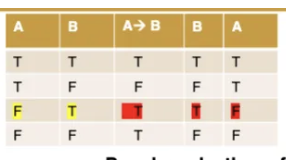
What’s the argument structure of: the formal fallacy denying the antecedent?
premise 1: If A then B
premise 2: not A (here you deny the antecedent of the conditional)
invalid conclusion: not B
example: If Maria eats a lot of meat, then she has high cholesterol. But she is a vegetarian. So, she does not have high cholesterol.
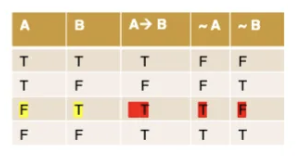
Why is learning formal logic useful?
To be more aware of the 2 formal fallacies, affirming the consequent and denying the antecedent
What are the 2 valid argument forms?
Modus Pones
Modus Tollens
What’s the argument structure of: Modus Pones
premise 1: If A then B
premise 2: A
valid conclusion: B
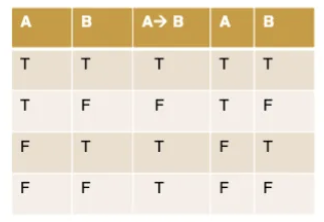
What’s the argument structure of: Modus Tollens?
premise 1: If A then B
premise 2: not B
valid conclusion: not A
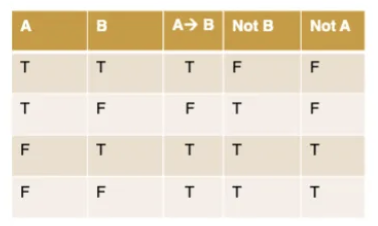
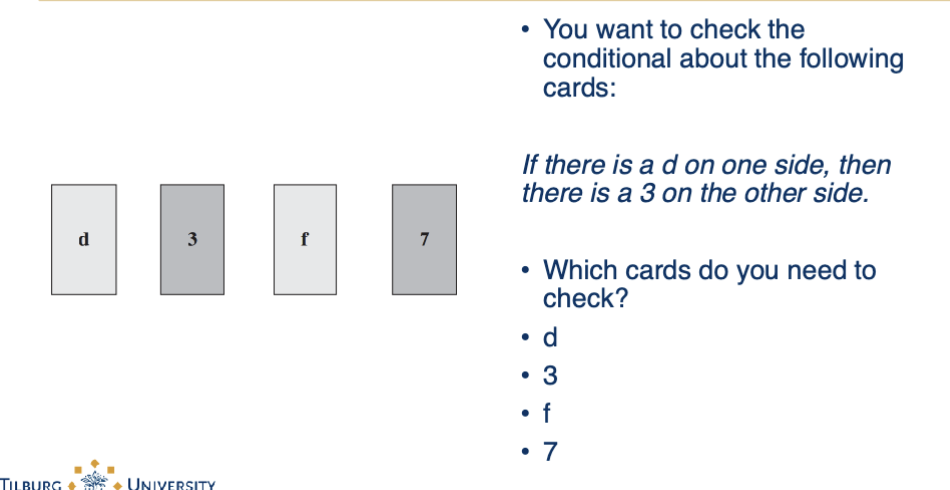
The Wason selection task, which cards do you check?
check d and 7
you check 7 bcs of the contrapositive form where not 7 implies not D
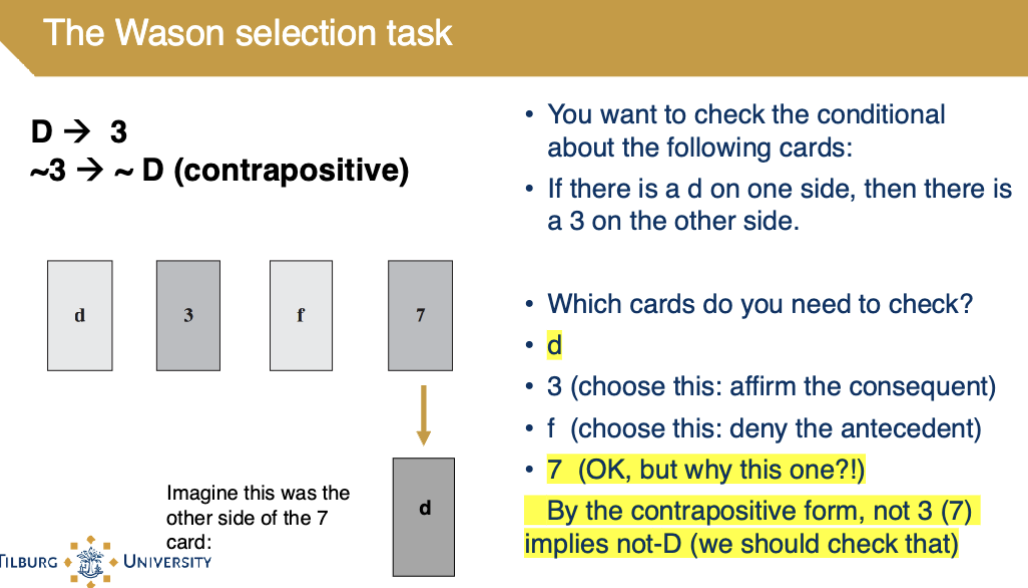
What is the contra-positive and converse of the conditional A → B?
Conditional: A → B
contra-positive: ~B → ~A
ex. if you are not in the Netherlands, you are not in Tilburg
converse: B → A
ex. if you are in the Netherlands, you are in Tilburg
What are 2 important things to note about conditionals regarding their contra-positive and converse forms?
every conditional is logically equivalent to its contra-positive form
conditionals are not logically equivalent to their converse form
What does the Wason selection task depend on?
its content
Psychologists have noticed that the content of the conditional influences the ability to get the right answer.
But, from a formal logic perspective, the content does not matter.
This strongly suggests that humans don’t directly implement logic rules in their reasoning.
Why is the Watson selection task so hard for humans?
Cognitive psychologists have proposed a bewildering number of theories to explain why people are so much better at solving such versions of the selection task compared with other, formally equivalent variations, like the original card version. The most generally cited of these theories, due to Leda Cosmides (1985, 1989), is that humans have evolved a specialised algorithm (or procedure) for detecting cheaters in social contracts.
The algorithm has the general form: If you accept a benefit, then you must meet its requirement
we’re sensitive to the content
Deductive conditional reasoning
Psychologists still argue what exactly is going on.
But, its clear that people constantly fail to note the equivalence between a conditional and its contrapositive form.
Sometimes its super easy:
“If students get above 5.5 in the final, they pass the course.”
I didn’t pass the course!
Oh, you got a bad result in the final...
In abstract and scientific contexts, the equivalence can be much harder to detect (remember the ravens from the tutorial?)
What is an advantage and disadvantage of inductive arguments?
advantage: an easy way to get from evidence (observations) to general statements
disadvantage: the conclusion is never 100% certain (unlike deduction)
What is an advantage and disadvantage of abductive arguments?
advantage: an easy way to draw conclusions about an uncertain world
disadvantage: is it even rational? why should we be confident in the conclusion?